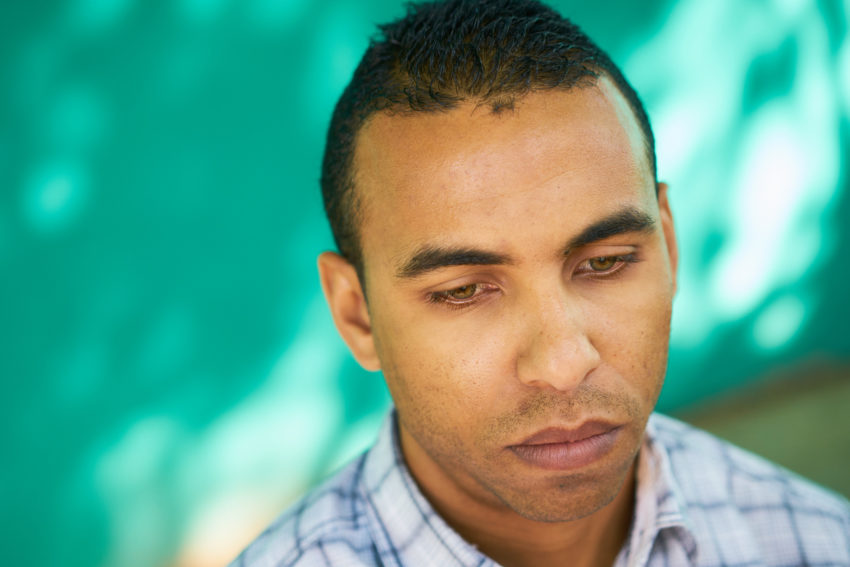
Share On Social!
COVID-19 doesn’t discriminate.
But U.S. Latinos are more likely than all Americans to say the coronavirus pandemic changed their daily lives, and disrupts their mental health, finances, and jobs, according to new Pew Research Center surveys.
“Latinos make up significant portions of the hospitality, construction, leisure and agricultural sectors of our labor market, and are the largest uninsured population in America,” wrote Kristian Ramos, ex-spokesman for the Congressional Hispanic Caucus, for The Hill. “These workers and uninsured families are unable to telecommute, will not be paid if their jobs are lost, and likely do not have immediate access to health care.”
Latino Daily Life During COVID-19
Early on in the outbreak, Pew Research Center reported that a higher percentage of U.S. Latinos said coronavirus is a threat to day-to-day life (49%) than the overall population (36%).
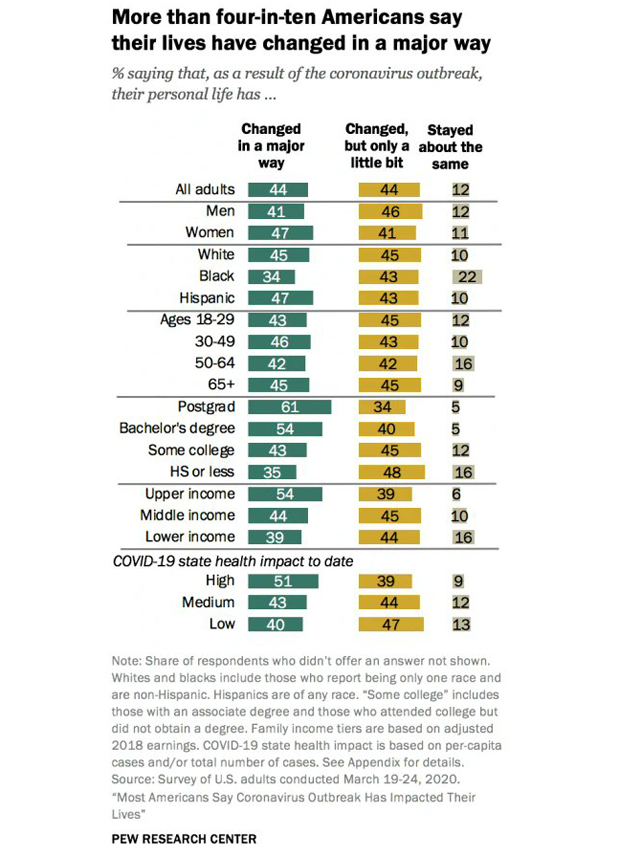 Those fears seem well-founded.
Those fears seem well-founded.
Since then, almost 9 of 10 of all adults say their personal life has changed “at least a little” due to the coronavirus pandemic, according to a March 30, 2020 survey of 11,537 people by Pew Research Center.
Coronavirus has caused a “major” change in life for 44% of adults.
More Latinos experience this major change (47%) than their white (45%) and black (34%) peers.
A separate poll by Kaiser Family Foundation on April 2, 2020, found similar percentages of Latinos (40%), whites (45%), and blacks (47%) who say coronavirus has disrupted their lives “a lot.”
“No group seems immune to the disruption by coronavirus,” according to the foundation.
Latino Job Loss During COVID-19
Even before COVID-19, Latinos struggled with poverty and low income.
Now Latinos, young adults, and low-income groups are hit hardest by coronavirus-related job loss, according to a Pew Research Center survey on March 26, 2020.
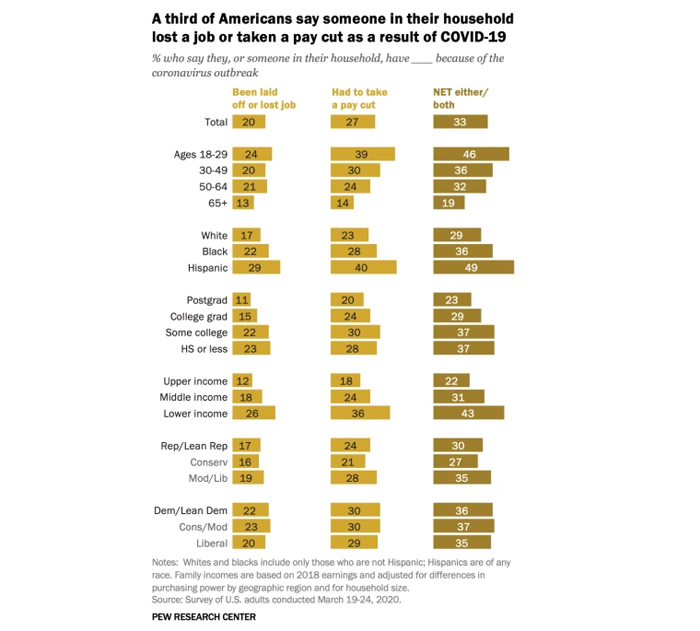 “Nearly half of Hispanics (49%) say their household has had someone lose their job or take a pay cut because of the COVID-19 outbreak,” according to the survey. “Smaller shares of black (36%) and white (29%) people say the same.”
“Nearly half of Hispanics (49%) say their household has had someone lose their job or take a pay cut because of the COVID-19 outbreak,” according to the survey. “Smaller shares of black (36%) and white (29%) people say the same.”
The more recent poll by Kaiser Family Foundation reinforced this disheartening data.
“[Significant percentages of] Hispanic adults (44%), black adults (42%), and white adults (36%), as well as nearly half (47%) of parents with a child younger than 18 years old report they have either lost their job, income, or had their hours reduced without pay,” according to the survey.
Latino Finances, Health During COVID-19
In addition to job loss, Latinos fear coronavirus will disrupt their finances and health.
Almost half of Latinos and black adults (48% and 49%, respectively), say coronavirus is a major threat to their personal health, more than white adults (39%), according to a Pew survey.
More also Latinos worry about their finances (50%) than Americans overall (34%).
The Pew survey also found that Latinos “might be financially more vulnerable than other Americans if the coronavirus forces them to stop working.”
In fact, only 16.2% of Latino Americans can work from home—the far lowest percentage among groups.
“Around two-thirds of employed Hispanic adults (66%) say they would not get paid if the coronavirus caused them to miss work for two weeks or more,” Pew reports. “About half (47%) who say it would be difficult to meet expenses during this time.”
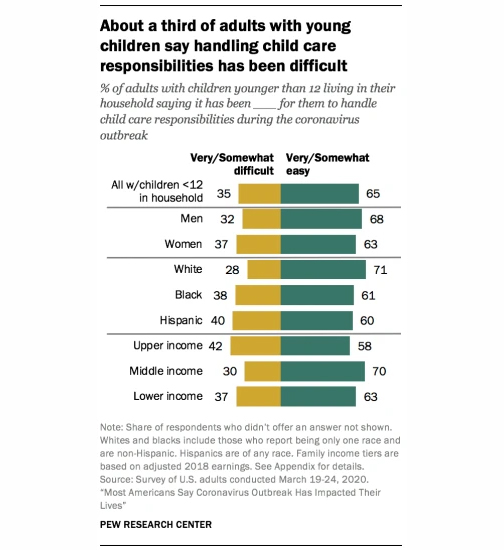 These fears extend to child care burdens, too.
These fears extend to child care burdens, too.
In fact, about 1 of 3 Latino adults with children younger than 12 at home say handling child care responsibilities has been difficult for them during the outbreak. At 40%, that’s more than white (28%) and black (38%) adults who say the same, Pew found.
Also, more Latinos (64%) than the general population (36%) worry they won’t be able to afford testing or treatment for coronavirus if they need it, according to a Kaiser Family Foundation poll on March 17, 2020.
The Families First Coronavirus Response Act will help with free testing and paid sick leave.
But rural populations may not have enough access.
“[We are] receiving on-the-ground reports from rural providers who have grave concerns about their ability to combat COVID-19,” according to the National Rural Health Association.
Latino Psychological Distress During COVID-19
Coronavirus also is spiking people’s stress levels.
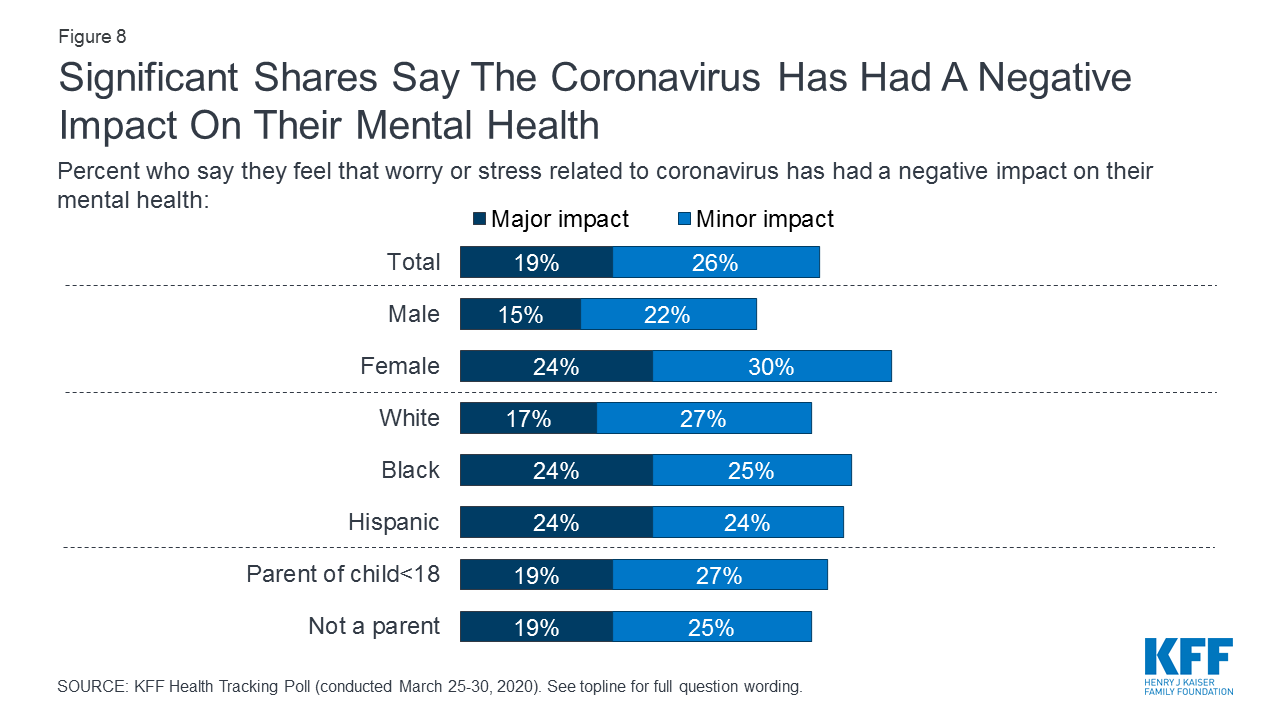 More Latinos (24%) than whites (17%) say coronavirus has had a negative “major impact” on their mental health, according the April 2 Kaiser poll.
More Latinos (24%) than whites (17%) say coronavirus has had a negative “major impact” on their mental health, according the April 2 Kaiser poll.
Psychological distress due to coronavirus is a real issue, according to a Pew poll on March 30, 2020.
Among Latinos, 28% are in the “high psychological distress” category (28%). That is a high percentage than their black (26%) and white (22%) peers.
High distress also is worse for those who suffer job or income loss.
“One-third of lower-income Americans (33%) are in the high distress group, as are 29% of those in households that have experienced job or income loss as a consequence of the outbreak,” according to Pew. Far fewer people in upper-income households are in the high-distress category.
Latinos, Especially Immigrants, Need COVID-19 Information
It’s not hard to imagine that coronavirus fears are even higher among immigrants.
Just look at Washington, D.C. (11.3% Latino). Three of the nine coronavirus-related deaths as of April 1, 2020, were people at home who did not seek care.
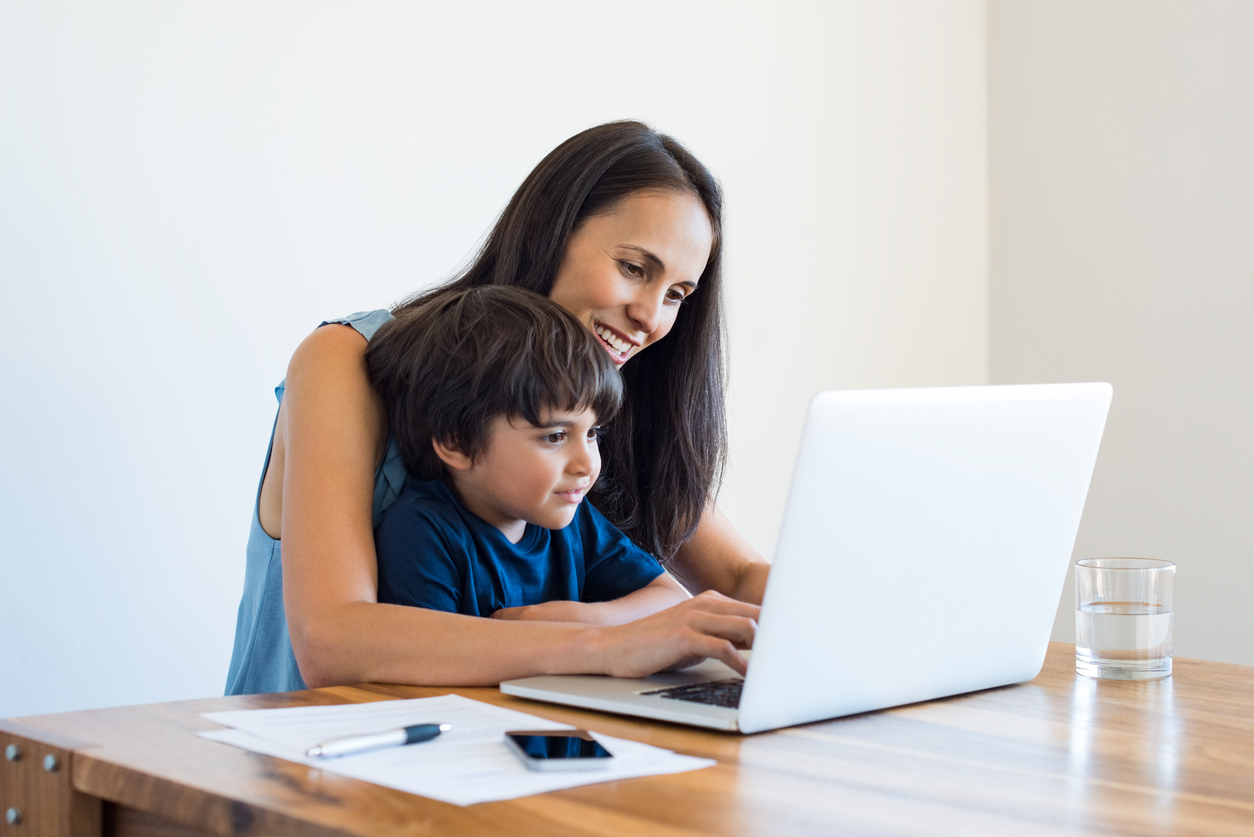 “We’re getting both people who are concerned among our patient population of the public, and then also people who just haven’t gotten the memo,” said Catalina Sol, leader of La Clinica del Pueblo in D.C., according to WJLA. “Lack of information that can easily be transmitted to people can be a challenge because many of these people do not have computers or internet access.”
“We’re getting both people who are concerned among our patient population of the public, and then also people who just haven’t gotten the memo,” said Catalina Sol, leader of La Clinica del Pueblo in D.C., according to WJLA. “Lack of information that can easily be transmitted to people can be a challenge because many of these people do not have computers or internet access.”
As a result, more Latinos (49%) than black (37%) or white adults (34%) are turning to social media to share or post coronavirus-related content, according to Pew Research Center.
So group are increasingly stepping up to deliver Spanish-language resources. This includes doctors, health agencies like CDC, nonprofit and immigration organizations, and more.
We at Salud America! also have a coronavirus explainer in Spanish.
“People want to know what they can do to keep loved ones and their families safe, especially in the Latino community, where the elderly often live with families,” Darryl Morin of Forward Latino told NBC Latino. “Lives are on the line.”
Latinos Need Underlying Change amid COVID-19
Lawmakers are calling for racial/ethnic data among those treated and tested for coronavirus. This could monitor and address disparities in the pandemic response.
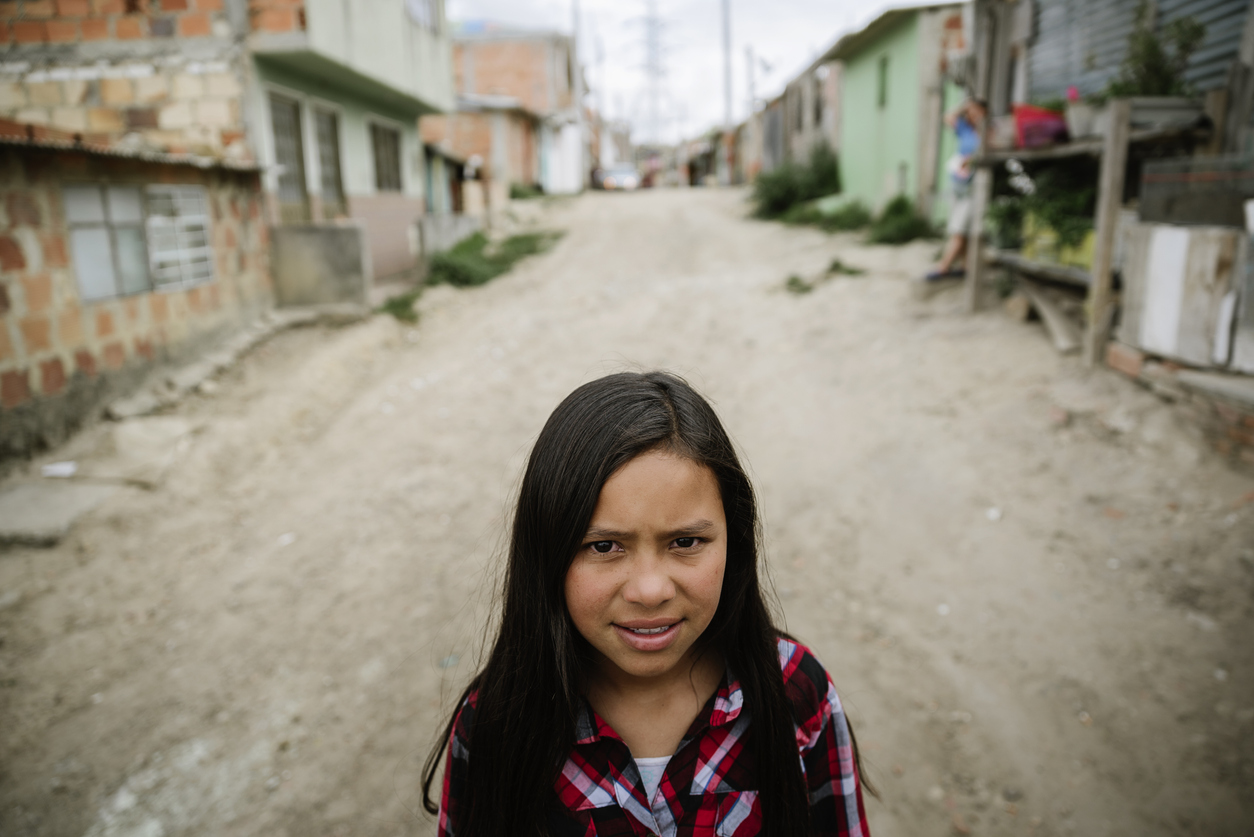 But even that won’t solve systemic inequities.
But even that won’t solve systemic inequities.
Instead, experts say structural change is needed to address the underlying inequities in access to income, health care, housing, transportation, and more.
“There is a need and an opportunity to start fixing America’s underlying problems right now,” writes David Madland of the Center for American Progress. “Progressives should seize the moment … to fully respond to the COVID-19 pandemic and prepare the country for a strong recovery.”
By The Numbers
142
Percent
Expected rise in Latino cancer cases in coming years



